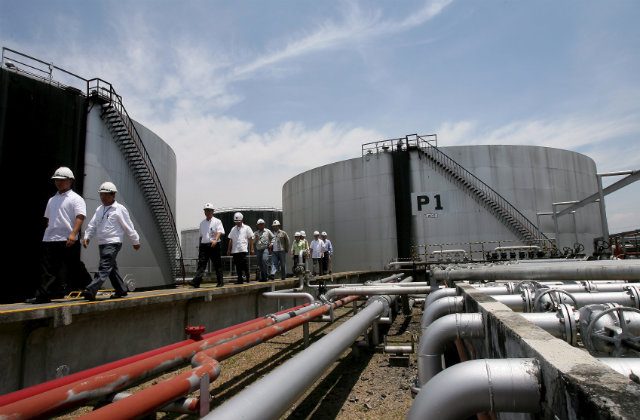SUMMARY
This is AI generated summarization, which may have errors. For context, always refer to the full article.

MANILA, Philippines – Amid extremely low global oil prices, the Department of Energy (DOE) has instructed the Philippine National Oil Company (PNOC) to review previous plans to store fuel supply for future use.
“One of the tasks of the PNOC this year is to study the possibility of fuel stockpiling. They have studied this before, but PNOC will take another look at it. They have to make a report this year,” said DOE Secretary Zenaida Monsada during a news conference.
Oil remains about 70% below its 2014 peak, with supply far exceeding demand.
Earlier this week, Saudi Arabia and Russia agreed to freeze oil output at near-record levels in a bid to shore up the falling price. But it’s a plan that must be approved by other major oil producers, and a move that drew muted market response.
The price of gasoline in the country has slid by P3.80 per liter since the start of the year, diesel by P3.90 per liter, and kerosene by P4.20 per liter.
Government may not be involved
Monsada noted that most countries resort to fuel stockpiling through legislation. She pointed out, however, that high costs may prevent the Philippine government from following suit.
“In Japan, the cost is shared between the government and the private sector. Oil is a finite resource. Because [PNOC] is a government corporation, there are many rules that must be followed. At the moment, where do we store the supply? The carrying costs is also too huge for the government to shoulder,” she explained.
“The DOE can’t do it. That’s why PNOC was tasked to study this. PNOC will hire a consultant for this,” Monsada added.
Ministers of other Southeast Asian countries, the DOE official also said, have been asking whether the Philippines will resort to fuel stockpiling.
Logistical issues
DOE Director Melita Obillo previously said that “to have an oil stockpile is good at this time, since prices are low,” but raised the question of whether the private sector has the financial and logistical ability to carry this out.
She pointed out that stockpiling fuel for a year could cost P300 billion ($6.3 billion), adding that even on a quarterly basis, the government still cannot afford it. Last year, the DOE’s budget was only around P700 million ($14.7 million).
A few years ago, the PNOC also considered fuel stockpiling for use in “extraordinary need.”
At the time, the cost of doing so was estimated at around P2.4 billion ($50.4 million) to acquire 50 million liters of diesel.
Oil firms, which import petroleum products, are able to store their supply for 15 to 30 days. Firms with refineries can store theirs for up to two months.
An official of one of the oil firms, who wished to remain anonymous, said there are “intricacies” involved in stockpiling.
One, the government has no ready tanks and huge facilities to store the fuel.
Two, the massive purchase of fuel may not be included in its budget.
Three, there are other government procedures that have to be complied with that could be time-consuming. Upon full compliance, “the oil prices may no longer be low thus defeating the purpose for which these conditions may have been established,” the official explained.
“At any rate,” the official added, “the government through its vast powers can effectively set up measures to cushion radical price movements.” – Rappler.com
$1 = P47.62
Add a comment
How does this make you feel?
There are no comments yet. Add your comment to start the conversation.